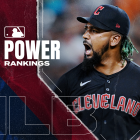Miguel Cabrera's injury has sidelined him for the year, which means that the Tigers lose another year of the 35-year-old slugger's career. Cabrera has been battling injuries for the Tigers the past few years, missing the end of 2017 with herniated discs in his back and dealing with hamstring injuries to start this season. Cabrera's latest injury is a ruptured tendon in his bicep, bad news that only gets worse when Tigers fans recall that he's under contract until 2023, something baseball fans are quick to remind them of.
Cabrera's contract, on the surface, definitely looks ugly. If you need a reminder of how the extension -- signed in 2014 and beginning to be enacted in 2016 -- shook out, here's a reminder via Spotrac.
Year | Age | Salary |
2016 | 33 | $28 million |
2017 | 34 | $28 million |
2018 | 35 | $30 million |
2019 | 36 | $30 million |
2020 | 37 | $30 million |
2021 | 38 | $30 million |
2022 | 39 | $32 million |
2023 | 40 | $32 million |
2024 (team option) | 41 | $30 million |
2025 (team option) | 42 | $30 million |
All things told, the contract was worth $248 million and eight years, with two team options in 2024 and 2025 that would vest if Cabrera finished in the top 10 in MVP voting the year prior. It's a boatload of money for a player that is 35 and only getting older. He'll be 40 by the time the guaranteed portion of the contract expires.
So it was definitely a bad deal right? We're on the third year of the extension, right in the meaty part money-wise and Cabrera's body is already breaking down. In that regard, yes. Injuries are unpredictable, but putting a big-bodied player on contract until he's 40 is risky at best and myopically stupid at worst. The Tigers are on the hook for $154 million with Cabrera still, so it looks bad. There were also incentives for more money that we're assuming Cabrera won't meet, but we'll revisit those later.
With that being said, the context of this contract is important. When Cabrera signed this contract, he was still with the Tigers for two more seasons. The extension was, again, signed in 2014. Cabrera was due $22 million in 2014 and 2015, so this extension was signed ahead of time.
And the timing was amazing. Cabrera was coming off of back-to-back MVP seasons in 2012 and 2013, including a Triple Crown in 2012. Since joining the Tigers in 2008, Cabrera had made four All-Star Games. he was batting .327/.407/.588. He was putting up video game numbers, plain and simple. The other thing that Cabrera brought to the Tigers? Marketability. The Tigers' 2006 team that made the World Series didn't have that premier superstar hitter people could gather around. Carlos Guillen was the team's leading hitter, Placido Polanco was fire no flash, and Ivan Rodriguez was arguably the biggest name on the roster that wasn't Justin Verlander, a rookie sensation at the time.
Which brings me to the next point: Sustained success. The Tigers missed the playoffs after 2006 until 2011.
At the time the Cabrera extension was signed, the Tigers had three straight playoff appearances and three straight years with a series win. They had defeated the Yankees two years in a row, and were a year removed from making the World Series. This was the second time in team history that the Tigers had made the playoffs for three consecutive years, with the only other time coming between 1907 and 1909. In all three of those years, they lost in the World Series.
Mike Ilitch had owned the Tigers since 1992. Before the Tigers traded for Cabrera in 2008, the Tigers had recorded losing records in 13 of 16 seasons, including the infamous 119-loss season in 2003. Ilitch, who was 84 years old the year the extension was signed, wanted to bring a championship to Detroit, and he wanted to build around Cabrera to do it. Verlander had just signed his seven-year $180 million contract in 2013, so it was about winning immediately. While that didn't pan out for Ilitch, who died in February 2017, it's hard to blame him for wanting to lock up two generational talents in a market that doesn't necessarily draw them. One was drafted and one was traded for. The Tigers don't necessarily get tons of looks in free agency.
This contract was structured around building a winning team with Cabrera as the focal point, which brings us back to the incentives. A $200,000 bonus for winning World Series MVP; a $150,000 bonus for winning LCS MVP; a $2 million MVP bonus, and a $1 million bonus for winning World Series MVP, the Hank Aaron Award and MVP. This contract was signed to get the Tigers wins, and it was designed to make it clear that those wins centered around Cabrera. The incentives were based around the assumption of sustained success.
The beginning of the end came after the 2014 ALDS sweep at the hands of the Orioles. The Tigers went 74-87 the following season, dead last in the AL Central. Dave Dombrowski was let go in August of 2015, and Al Avila became acting GM. After a decent 2016 season, the Tigers finally tanked in 2017, going 64-98 and making a few rebuilding moves, including dealing Justin Verlander at the deadline. They simply didn't have the depth or the leverage to handle a reload instead of a rebuild.
Then there's the final point, and this might be the most important: Cabrera has had exactly one bad season with the Tigers, including this season. 2017 was an abject catastrophe. People were rightfully questioning if Cabrera was done. He hit .249/.329/.399 in 2017, all career-lows outside of his rookie season in 2003. His 16 homers were also his lowest number since being a rookie.
This year, Cabrera was hitting again. He was back up to .299/.395/.488, which aren't historically amazing given what he's done, but he was finding his form while battling a hamstring injury. He rubbed fans the wrong way with his comments about refusing to play injured earlier in the season, but it seemed to come as much from a place of frustration in his rehab timeline being thrown off as it did annoyance with media and fans (which it's tough to deny was almost certainly a factor). Cabrera won the Silver Slugger in 2015 and 2016, not to mention finishing ninth in MVP voting in 2016 when he went .316/.393/.563 with 38 home runs, his highest total since 2013. He'd had recent success, and signs pointed to at least the possibility that 2017 was an anomaly.
You just can't call injuries, and when you extend players, you can't bank on them. You especially can't bank on them when you're a team that doesn't command superstars. The Tigers had the fourth-highest payroll in baseball in 2016. The teams ahead of them? The Dodgers, Yankees and Red Sox. That isn't the norm for them. It wasn't until 2012 that we saw the Tigers really start to spend.
Yes, Cabrera is declining. He's 35, that happens. He's also 6-feet-4-inches, 240 pounds. It's impossible for anyone to put themselves in the Tigers' heads to find out what they were thinking when this contract was offered, but we can take educated guesses. Cabrera brought the Tigers a winning culture that they didn't have before. The team simply tanked after the extension because talent didn't pan out, Brad Ausmus didn't work as a manager and they hit a rebuild phase.
Arguably the worst part about this injury is that it robs baseball of another year of Cabrera. For the Tigers, in a year where all projections thought they'd be awful, they've been average to slightly below average. They're 31-37, 5.5 games back of the Indians in the AL Central. And even if they were never going to catch them, this further diminishes those slim chances. It's easy to look back at this contract and scoff with the state the Tigers are in now. But Cabrera isn't the reason that they're there.


















